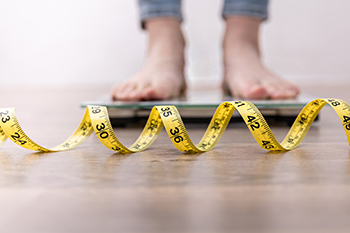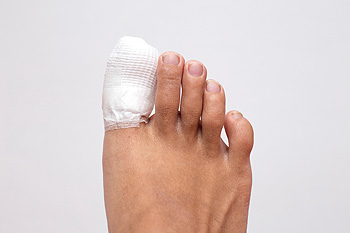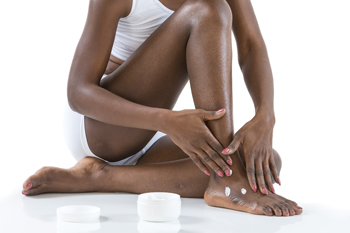Columbia (931) 380-0353
Pulaski (931) 424-3338
December 2021
Are Your Shoes Right for You?
 There are many issues and injuries that can impact the foot. Therefore, it is important to make sure that you are wearing shoes that fit correctly. Shoes should be comfortable and supportive, while also cushioning the foot. One way to ensure this is to purchase shoes that are specifically made for the physical activity you are doing. Another thing that can be done to ensure that shoes fit correctly is by purchasing them at the end of the day, when our feet are the largest. The toes should be able to comfortably wiggle in the shoes, and the heel should comfortably be gripped. Patients who have more questions about making sure they’re wearing the right shoes should consult with a podiatrist.
There are many issues and injuries that can impact the foot. Therefore, it is important to make sure that you are wearing shoes that fit correctly. Shoes should be comfortable and supportive, while also cushioning the foot. One way to ensure this is to purchase shoes that are specifically made for the physical activity you are doing. Another thing that can be done to ensure that shoes fit correctly is by purchasing them at the end of the day, when our feet are the largest. The toes should be able to comfortably wiggle in the shoes, and the heel should comfortably be gripped. Patients who have more questions about making sure they’re wearing the right shoes should consult with a podiatrist.
Getting the right shoe size is an important part of proper foot health. Seek the assistance of Brian D. Jackson, DPM from Neuhaus Foot and Ankle. Our doctor will provide the care you need to keep you pain-free and on your feet.
Getting the Right Shoe Size
There are many people who wear shoes that are the incorrect size, negatively affecting their feet and posture. Selecting the right shoes is not a difficult process, so long as you keep several things in mind when it comes to choosing the right pair.
- When visiting the shoe store, use the tools available to measure your foot.
- Be sure there is ‘wiggle room’. There should be about an inch between your toes and the tip of your shoes.
- Do not always assume you are the same size, as manufacturers run differently.
- Purchase shoes later in the day, as your feet swell as the day progresses.
- If a shoe is not comfortable, it is not suitable. Most shoes can’t be ‘broken in’, and comfort should be the ultimate goal when it comes to choosing the right pair of shoes
As our feet hold our body weight and keep us moving, it is important to treat them right. Picking the right pair of shoes can provide your feet comfort and mobility without pain.
If you have any questions, please feel free to contact one of our offices located in Columbia and Pulaski, TN . We offer the newest diagnostic and treatment technologies for all your foot care needs.
Do You Have Plantar Fasciitis?
 The plantar fascia is a band of fibrous tissue that runs along the bottom of the foot and connects the heel bone to the toes. When the plantar fascia becomes inflamed or partially torn, the injury is known as plantar fasciitis. Plantar fasciitis, which is often a result of overuse, results in heel pain, heel spurs, and pain in the arch of the foot. Pain from plantar fasciitis gradually worsens over time and is usually the worst after resting, especially after waking up in the morning, or sitting for a long period of time. Other times that pain from plantar fasciitis can persist include after exercise, when stretching the foot, or while pressing the sides of the foot. If you believe that you may have plantar fasciitis, it would be wise to consult with a podiatrist for a proper diagnosis and treatment plan.
The plantar fascia is a band of fibrous tissue that runs along the bottom of the foot and connects the heel bone to the toes. When the plantar fascia becomes inflamed or partially torn, the injury is known as plantar fasciitis. Plantar fasciitis, which is often a result of overuse, results in heel pain, heel spurs, and pain in the arch of the foot. Pain from plantar fasciitis gradually worsens over time and is usually the worst after resting, especially after waking up in the morning, or sitting for a long period of time. Other times that pain from plantar fasciitis can persist include after exercise, when stretching the foot, or while pressing the sides of the foot. If you believe that you may have plantar fasciitis, it would be wise to consult with a podiatrist for a proper diagnosis and treatment plan.
Plantar fasciitis is a common foot condition that is often caused by a strain injury. If you are experiencing heel pain or symptoms of plantar fasciitis, contact Brian D. Jackson, DPM from Neuhaus Foot and Ankle. Our doctor can provide the care you need to keep you pain-free and on your feet.
What Is Plantar Fasciitis?
Plantar fasciitis is one of the most common causes of heel pain. The plantar fascia is a ligament that connects your heel to the front of your foot. When this ligament becomes inflamed, plantar fasciitis is the result. If you have plantar fasciitis you will have a stabbing pain that usually occurs with your first steps in the morning. As the day progresses and you walk around more, this pain will start to disappear, but it will return after long periods of standing or sitting.
What Causes Plantar Fasciitis?
- Excessive running
- Having high arches in your feet
- Other foot issues such as flat feet
- Pregnancy (due to the sudden weight gain)
- Being on your feet very often
There are some risk factors that may make you more likely to develop plantar fasciitis compared to others. The condition most commonly affects adults between the ages of 40 and 60. It also tends to affect people who are obese because the extra pounds result in extra stress being placed on the plantar fascia.
Prevention
- Take good care of your feet – Wear shoes that have good arch support and heel cushioning.
- Maintain a healthy weight
- If you are a runner, alternate running with other sports that won’t cause heel pain
There are a variety of treatment options available for plantar fasciitis along with the pain that accompanies it. Additionally, physical therapy is a very important component in the treatment process. It is important that you meet with your podiatrist to determine which treatment option is best for you.
If you have any questions, please feel free to contact one of our offices located in Columbia and Pulaski, TN . We offer the newest diagnostic and treatment technologies for all your foot care needs.
Do You Suffer From Painful Feet?
Several Easy Steps of Foot Care
Caring for your feet is an important part of maintaining your foot health. This can be accomplished through several easy steps. First, you should wash your feet every day with soap and water to keep them clean. Next, dry your feet thoroughly, particularly in between the toes. This helps prevent foot fungus. Afterwards, apply a thick moisturizer to your feet and especially the heels. If you find that you have dry heels, exfoliate them once or twice a month using a wet pumice stone or loofah. Pamper your feet occasionally with a soak in warm water. Finally, make sure that you are wearing comfortable shoes and socks each day. For more information about daily foot care, please consult with a podiatrist.
Everyday foot care is very important to prevent infection and other foot ailments. If you need your feet checked, contact Brian D. Jackson, DPM from Neuhaus Foot and Ankle. Our doctor can provide the care you need to keep you pain-free and on your feet.
Everyday Foot Care
Often, people take care of their bodies, face and hair more so than they do for their feet. But the feet are a very important aspect of our bodies, and one that we should pay more attention to. Without our feet, we would not be able to perform most daily tasks.
It is best to check your feet regularly to make sure there are no new bruises or cuts that you may not have noticed before. For dry feet, moisturizer can easily be a remedy and can be applied as often as necessary to the affected areas. Wearing shoes that fit well can also help you maintain good foot health, as well as making it easier to walk and do daily activities without the stress or pain of ill-fitting shoes, high heels, or even flip flops. Wearing clean socks with closed shoes is important to ensure that sweat and bacteria do not accumulate within the shoe. Clean socks help to prevent Athlete’s foot, fungi problems, bad odors, and can absorb sweat.
If you have any questions please feel free to contact one of our offices located in Columbia and Pulaski, TN . We offer the newest diagnostic and treatment technologies for all your foot and ankle needs.
Obesity and Children’s Foot Health
 It is well known that obesity can affect an adult’s foot health, but did you know that being obese can also impact the health of a child’s feet? Obese children are at an increased risk of developing various foot problems, such as changes in foot biomechanics and walking patterns. Children who are obese tend to put far more load on their metatarsal bones than their healthy weight counterparts. This may increase the risk of foot injuries and acquired flat feet. If your child complains of foot pain, it is suggested that you schedule an appointment with a podiatrist.
It is well known that obesity can affect an adult’s foot health, but did you know that being obese can also impact the health of a child’s feet? Obese children are at an increased risk of developing various foot problems, such as changes in foot biomechanics and walking patterns. Children who are obese tend to put far more load on their metatarsal bones than their healthy weight counterparts. This may increase the risk of foot injuries and acquired flat feet. If your child complains of foot pain, it is suggested that you schedule an appointment with a podiatrist.
Obesity has become very problematic at this point in time and can have extremely negative effects on the feet. If you’re an obese individual and are concerned about your feet, contact Brian D. Jackson, DPM from Neuhaus Foot and Ankle. Our doctor can provide the care you need to keep you pain-free and on your feet.
Obesity and Your Feet
Since your feet are what support your entire weight when standing, any additional weight can result in pain and swelling. Being overweight is one of the main contributors to foot complications.
Problems & Complications
Extra Weight – Even putting on just a few extra pounds could create serious complications for your feet. As your weight increases, your balance and body will shift, creating new stresses on your feet. This uneven weight distribution can cause pain, even while doing the simplest tasks, such as walking.
Diabetes – People who are overweight are at serious risk of developing type-2 diabetes, which has a drastic impact on the health of your feet. As you get older, your diabetes might worsen, which could lead to loss of feeling in your feet, sores, and bruises. You could also become more prone to various infections.
Plantar fasciitis – Pressure and stress that is placed on muscles, joints, and tendons can trigger plantar fasciitis, which is an inflammation of tissue that forms along the bottom of the foot.
If you have any questions please feel free to contact one of our offices located in Columbia and Pulaski, TN . We offer the newest diagnostic and treatment technologies for all your foot and ankle needs.
Can I Run With a Broken Toe?
 A broken toe is a painful injury that may keep you off your feet for quite some time. This can be a difficult reality for an avid runner or athlete to accept. If you have broken your toe, it is strongly suggested that you rest it for several weeks to ensure a full recovery. Whether or not you can run, exercise, or even bear weight on a broken toe will depend on which toe is broken and the severity of the fracture. If the big toe is broken, then running will likely be impossible, as the big toe is responsible for pushing off the ground when you run and keeping the foot stable. If you have broken one of the three middle toes, it may be possible to exercise if the fracture is not severe, has not altered your gait, and you can still fit your foot comfortably in your running shoes. You should always follow the advice of a podiatrist prior to attempting any exercise with a foot or ankle injury. If you have broken your toe, please consult with a podiatrist.
A broken toe is a painful injury that may keep you off your feet for quite some time. This can be a difficult reality for an avid runner or athlete to accept. If you have broken your toe, it is strongly suggested that you rest it for several weeks to ensure a full recovery. Whether or not you can run, exercise, or even bear weight on a broken toe will depend on which toe is broken and the severity of the fracture. If the big toe is broken, then running will likely be impossible, as the big toe is responsible for pushing off the ground when you run and keeping the foot stable. If you have broken one of the three middle toes, it may be possible to exercise if the fracture is not severe, has not altered your gait, and you can still fit your foot comfortably in your running shoes. You should always follow the advice of a podiatrist prior to attempting any exercise with a foot or ankle injury. If you have broken your toe, please consult with a podiatrist.
Broken toes may cause a lot of pain and should be treated as soon as possible. If you have any concerns about your feet, contact Brian D. Jackson, DPM from Neuhaus Foot and Ankle. Our doctor will treat your foot and ankle needs.
What Is a Broken Toe?
A broken toe occurs when one or more of the toe bones of the foot are broken after an injury. Injuries such as stubbing your toe or dropping a heavy object on it may cause a toe fracture.
Symptoms of a Broken Toe
- Swelling
- Pain (with/without wearing shoes)
- Stiffness
- Nail Injury
Although the injured toe should be monitored daily, it is especially important to have a podiatrist look at your toe if you have severe symptoms. Some of these symptoms include worsening or new pain that is not relieved with medication, sores, redness, or open wounds near the toe.
If you have any questions, please feel free to contact one of our offices located in Columbia and Pulaski, TN . We offer the newest diagnostic and treatment technologies for all your foot care needs.









